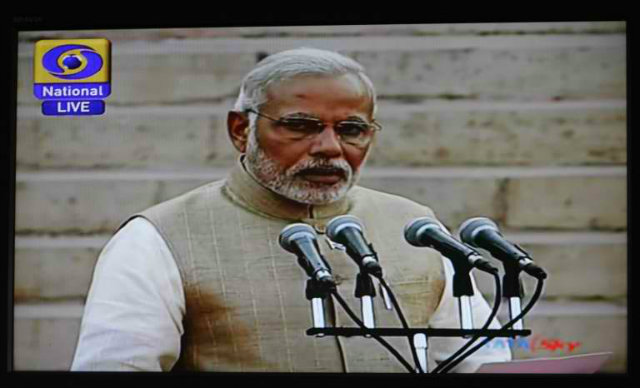SUMMARY
This is AI generated summarization, which may have errors. For context, always refer to the full article.

NEW DELHI, India – India’s new government, led by right-winger Narendra Modi, Thursday, July 10, unveils its maiden budget – its first big policy statement on how it intends to overhaul an economy saddled with slow growth and weak public finances.
Although Modi’s government will likely fail to shrink a yawning fiscal deficit and faces rising inflation, the mood of investors and voters remains buoyant as they look for detail on his long-term vision.
Modi, who swept to power with the strongest mandate in 30 years in May, “is a free-enterprise person and this (budget) is his moment to show what he intends,” D.H. Pai Panandiker, head of economic think-tank the RPG Foundation, told Agence FRance-Presse.
“Change can’t be overnight but Modi aims to be here for the long distance,” Panandiker said.
Rather than “big bangs” from Thursday’s budget, economists expect a credible outline of steps to steer India from a subsidy-laden, bureaucratic culture to a more business-friendly investment climate.
Growth has crashed from near double-digits a few years ago to 4.7% in 2013, marking the second straight year of sub-five percent expansion, hit by high interest rates, falling investment and wage-eroding inflation.
Modi, who as leader of Gujarat for the past 13 years steered the western state to 10 percent annual growth, won power in New Delhi on his “Modinomics” mantra of “minimum government, maximum governance” and a pledge of “good days ahead”.
Since taking power, he has attempted to play down hefty expectations even as investors drive the share markets to almost weekly record highs.
The 63-year-old has already warned that “bitter medicine” is needed to put the economy on track and prescribed the first dose last month, hiking fares on the ramshackle state railway to help pay for the loss-making network’s modernization.
Finance Minister Arun Jaitley, a close Modi confidant who will present the budget, is also sounding hawkish, calling for “fiscal discipline” and speaking out against “mindless populism” burdening public finances.
But reducing subsidies is a tough challenge in a country where two-thirds of the 1.25 billion population lives on under $2 a day, according to World Bank figures.
That fact was underscored when Modi had to partially roll back the rail fare increase in the face of a public outcry.
“Many reforms could take years to gain traction,” said HSBC economist Mahak Choudhary.
Overspending
Economists expect Jaitley to start paring back subsidies on fuel prices – imperative due to rising crude oil prices – and initiate efforts to ease bureaucratic controls stalling investment.
Other announcements could include a goods and services tax long sought by business that would replace India’s complex patchwork of levies, as well as plans to loosen complicated land-buying rules.
They also expect him to exploit a bullish market to more than double privatization revenues to as much as $650 billion rupees ($10 billion) by selling holdings in state firms.
The Sensex, Mumbai’s benchmark share index, closed up just over half a percent at 25,962.06 points on Friday, July 4, a rise of seven percent since Modi’s victory on May 16. The index has risen 20 percent since the start of 2014.
International investors who fled over reform policy inaction by former Congress premier Manmohan Singh and huge corruption scandals have been flooding back on hopes of change.
But economists believe the stumbling economy may mean some slippage in the budget deficit to 4.5% of gross domestic product from the 4.1% target set by the previous Congress party government.
Jaitley could also send a positive signal to investors overseas by announcing a hike to the limit for foreign direct investment in defense companies, which is currently set at 26%.
“Countries now are looking more closely to India and they expect that growth will go up, that investment opportunities will open up,” the RPG think-tank’s president said.
Even though Modi won the first majority in India’s lower house in three decades, he still lacks the majority in the upper house needed to approve many initiatives, meaning he will have to build consensus for changes.
The BJP also runs only eight of India’s 29 states, which have jurisdiction in many economic areas such as reform of land acquisition rules and a simplified national tax.
This means “implementation (of change) will likely take time and deft negotiations by leaders in New Delhi,” said HSBC’s Choudhary. – Rappler.com
Add a comment
How does this make you feel?
There are no comments yet. Add your comment to start the conversation.